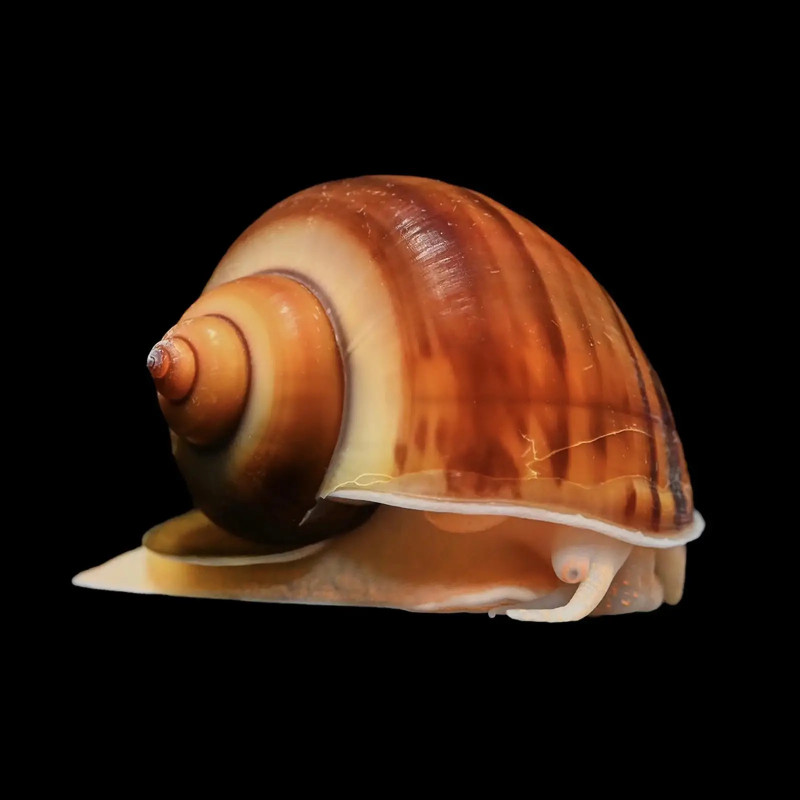Stocks Available
Yellow Rabbit Snail
SKU:116434
Tylomelania sp
1.18-1.97 INCH

Stock Available
Introduction: Species: Pomacea bridgesii Common Names: Albino Mystery Snail, White Mystery Snail, Gold Inca Snail Natural Habitat: Native to the slow-moving freshwater rivers, ponds, and swamps of South America, particularly in the Amazon Basin. These snails are often found in areas with abundant vegetation and still waters. Physical Characteristics: Appearance: The Albino Mystery Snail has a creamy-white to translucent shell, giving it a striking and elegant appearance. Its body is pale white with a light pink or yellowish hue, adding to the albino effect. The shell itself can vary from smooth to slightly ribbed, with a spiral pattern that accentuates its form. Size: Grows up to 2 inches (5 cm) in diameter. Lifespan: Typically 1-2 years with proper care. Habitat Requirements: Tank Size: A minimum of 5 gallons is recommended per snail, though larger tanks provide better stability for water parameters and more room for exploration. Water Conditions: Temperature: 68-84°F (20-29°C). pH: 7.0-8.4 (prefer slightly alkaline water to maintain shell health). Aquascaping: Provide a well-planted tank with smooth substrate to prevent damage to the snail’s delicate foot. Mystery Snails appreciate plenty of hiding spots such as driftwood, rocks, and dense plant coverage. Ensure easy access to the water surface for them to breathe air occasionally. Diet: Primary Diet: Herbivorous; in the wild, they consume algae, plant material, and detritus. Supplemental Feeding: In the aquarium, they should be provided with a diet of blanched vegetables (such as spinach, zucchini, or lettuce), algae wafers, and calcium supplements to promote healthy shell growth. They may also graze on algae that naturally form in the tank. Feeding Frequency: Feed small amounts 2-3 times a week, and monitor for leftover food to prevent water quality issues. Compatibility: Temperament: Albino Mystery Snails are peaceful and non-aggressive, making them excellent additions to community aquariums. They are slow-moving and prefer calm tank mates. Suitable Tank Mates: They get along well with other peaceful species, such as small tetras, rasboras, livebearers, and dwarf shrimp. Incompatibilities: Avoid housing them with aggressive or fin-nipping species like large cichlids or crayfish that may harm the snails. Care Level: Difficulty: Easy; Mystery Snails are hardy and adaptable, making them ideal for beginner aquarists. Stable water parameters and good tank hygiene are essential for their well-being. Health Monitoring: Ensure they have access to calcium for shell health, and keep an eye out for shell erosion or cracks. Proper filtration and regular water changes are important to maintain water quality, as snails are sensitive to high levels of ammonia or nitrites. Breeding: Breeding in Captivity: Albino Mystery Snails are easy to breed. They lay eggs above the waterline in a gelatinous mass, usually at night. Spawning: Once laid, the eggs will hatch in 2-4 weeks, depending on temperature. Ensure the eggs stay moist but not submerged. The babies can be fed the same diet as adults, with finely crushed food and vegetables. Economic Considerations: Market Demand: High demand for their striking albino coloration and peaceful nature, making them popular for both beginner and experienced aquarists. Wholesale/Retail Pricing: Albino Mystery Snails are widely available and relatively affordable. Sustainability and Conservation: Wild Population: Not considered at risk, as Mystery Snails are abundant in the wild and commonly bred in captivity. Aquaculture Efforts: They are frequently bred in captivity, reducing the need for wild collection. Regulations: Ensure compliance with local regulations, as some regions restrict the release of non-native snails into the wild due to their potential as invasive species. Conclusion: The Albino Mystery Snail is a peaceful and beautiful addition to any freshwater aquarium. With its striking appearance and gentle temperament, it adds visual appeal and helps keep the tank clean by grazing on algae and detritus. Their low-maintenance care requirements make them suitable for beginner aquarists, while their unique appearance ensures they remain a favorite among hobbyists.
Data sheet
12 other products in the same category:
Customers who bought this product also bought: